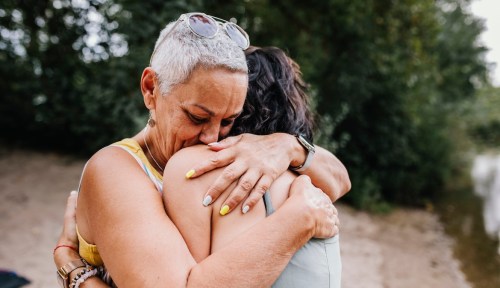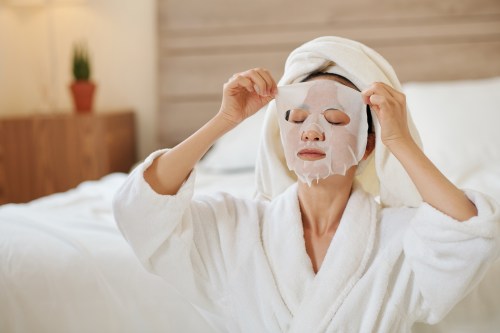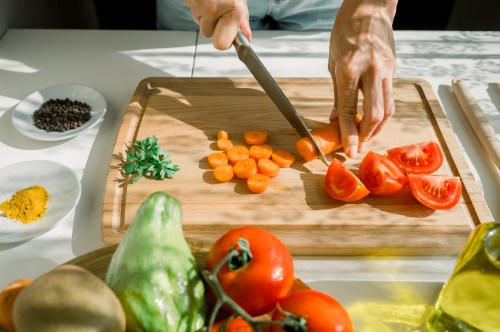Our editors independently select these products. Making a purchase through our links may earn Well+Good a commission
This week on The Plus Factor, we’re talking about a crucial part of health and happiness that’s often forgotten about: interpersonal connection. So much sweating, meditating, and smoothie sipping is done solo, and while those are all awesome habits, it’s also important to be social. Why? Keep reading to find out. You might be surprised at just how important it is.
If you were to plan the ultimate healthy Saturday, what would it look like? Maybe you’d wake up and meditate in the morning before hitting Trader Joe’s to stock up on organic groceries. Then, after making a meal loaded with good-for-you foods, you’d go to a yoga or spinning class. And maybe you’d end the day with a bath so luxurious that it begs to be Instagrammed. It doesn’t get healthier than that, right?
But if you’re building your life around me-time, exclusively—your individual workout, your customized diet, capped off with your self-care regimen, all documented on your personal social media platforms—you may feel like something major is missing. And you’d be right.
If you’re building your life around me-time, you may feel like something major is missing. And you’d be right.
“Meditation and working out are awesome, but those activities are often done in isolation,” says Jeremy Fischbach, who along with a team of other psychology grads from Princeton University developed Happy—a service where people in need of emotional support can call and get paired with listeners trained in giving it.
Studies show that heart patients, for example, with fewer than four people in their close support network have more than double the chance of cardiac death—and low quantity (or quality) of social ties has been linked with everything from high blood pressure and cancer to impaired immunity and inflammation in the body.
At the same time, in a world where you can order meals, movies, and even sex (Tinder, you up?) on your phone without uttering a word, interpersonal connection (as in spending time with other people, ideally IRL) is a wellness building block that’s becoming downright wobbly for many people.
So, that urge to grab brunch every Sunday? Or talk with your mom each week? Or to find a solid running buddy? These instincts to meet up, share, and support each other aren’t just niceties. They might just be keeping you from getting sick.
But how exactly does hang time (or even quick chats with your favorite dry cleaner or the guy at the corner store) affect your health? And how much do you need on a regular basis? Here, several experts within the wellness world sound off on this important—yet often overlooked—area of well-being.

How a tribal society came to idolize being alone
Even if you snoozed all through history class growing up, you probably know that human culture didn’t start out in neat nuclear families. “We are mammals and part of the importance of being mammals is that we need to be in close proximity to each other,” says holistic women’s health expert and healer Kimberly Johnson. She regularly holds workshops with WMN Space in Los Angeles to bring women together in a way that creates community through sharing personal experiences.
“We’re really meant to live collectively, but we’ve evolved because we have this puritanical society that [rewards] independence, either doing it all on your own or in a nuclear family,” Johnson says. “The truth is, most people need a lot more support than that.” If your secret Pinterest board doesn’t include having a family or a house with a white picket fence, chances are that either living with a partner or alone in a dope apartment with no roommates is the ultimate goal.
“We have this puritanical society that [rewards] independence, either doing it all on your own or in a nuclear family. The truth is, most people need a lot more support than that.” —Kimberly Johnson, holistic women’s health expert
Now, alone time and personal space are highly valued. “I was in a yoga class the other day standing directly across from someone and it was like we had to play this whole game of pretending not to look at each other,” Johnson says. “It was really interesting to me because I had just come from living in Brazil for eight years where the term ‘personal space’ doesn’t even exist. It’s just not a concept for them.”
But is it really so wrong to value a night in watching Netflix alone or not wanting to introduce yourself someone on the yoga mat next to you? Really, what’s the big deal?
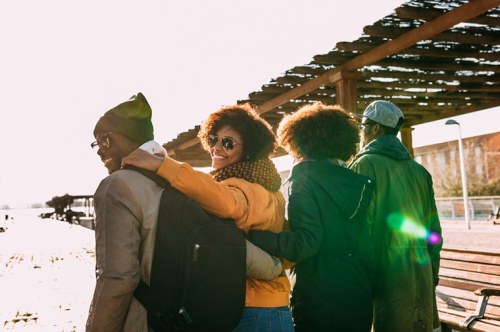
How interpersonal connection affects your health
Part of why Fischbach launched the Happy app is because he’s seen through scientific studies just how important connection is. “It’s a basic human need, just like water or food,” he says. “We can go a few days without water before we die. We can go maybe a month without food before we develop serious health problems. Emotional support is next. If we don’t have regular doses of emotional support, we develop health problems. We’re seeing that happen in this country. It’s probably getting worse by the year.”
A lot of studies back him up. One shows that people in social isolation actually can become dumber over time. Another study shows that people who had a stroke recover significantly faster if they have emotional support from others. Social relationships even affect longevity.
Like Fischbach, The Loneliness Cure author Kory Floyd has done a deep dive into just exactly how interpersonal connection affects well-being. “There’s enough research now for us to claim that it’s pretty close to vital,” he says. “One of the ways that we know someone isn’t getting enough connection with other people is that their health and wellness suffers in some pretty extreme ways.” Some ways: Heart problems, getting sick more often, and poor sleep.
Floyd also points out that, like food and sleep, the amount of interpersonal connection people need varies from person to person—especially depending on where they fall on the introvert-to-extrovert scale. Which brings up another important question: How do you know how much social connection you need? And what’s the best way to get it?
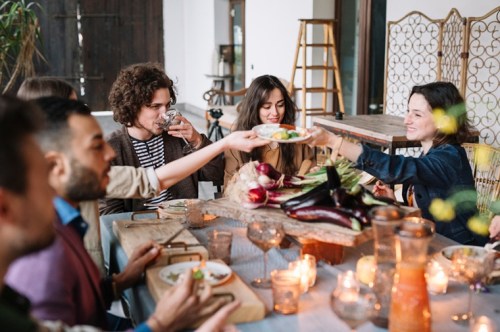
The different types of interpersonal connection—and how much you need
Even though food, sleep, and connection are all basic needs, Floyd brings up an important point: There isn’t a built-in physical signal—like getting tired or hungry—when you’re low on connection. “You do have to be more attuned to yourself, but noticing when you start feeling lonely or isolated is a sign,” he says.
Again, he stresses that not only will the amount of interpersonal connection vary from person to person—and even from time to time—the type of connection will vary too. One person may be content grabbing matcha with a friend one-on-one while another person won’t be fully satisfied unless she hits up at least one good party over the weekend. You have to gauge what you need for yourself, partially thinking back to what has made you feel happy before.
Suffering from depression is a bit trickier, says Floyd. Even though being around people will likely help you feel better, leaving your warm couch sounds torturous. “[Some scientists think] that conditions like depression evolved to cause us to become introspective and disengaged from social engagement for a while as a way of signaling to others that we need help. In that way, I think we could make the argument that those are times when our social needs change,” he says, adding that his advice would be to seek out one or two people you feel most comfortable around and not forcing yourself to go to a big party.
“You do have to be more attuned to yourself, but noticing when you start feeling lonely or isolated is a sign.” —Kory Floyd, author of The Loneliness Cure
Besides paying attention to how much connection is right for you, Floyd says there are two things to keep in mind: Social connection should be frequent and meaningful—not necessarily at the same time. “You could have deep conversations with friends you rarely see, which makes it meaningful, but not frequent. And you can have interactions with people all day, like the cashier at the grocery store and your coworkers, but that doesn’t make it meaningful,” he explains. Again, the amounts of what you need of both is going to vary from person to person.
You might be wondering where texting and social media fit in. Does DM-ing your friends count as connection? In Floyd’s opinion, it does. “For people who are isolated because of age, suffering from a chronic illness, or live in a rural community, social media can really be a lifeline,” he says. “Also, for people with depression, reaching out with a text or through social media can be a much less intimidating step to take when asking for help. When it comes to technology, it’s not about what it can do, but how we use it.”

How to add more interpersonal connection to your life
Okay, so now you know about the different types of interpersonal connection and why it’s so important. Now the big question: How do you get more of it? Being armed with all this info might not suddenly empower you to chat up the guy or girl on the treadmill next to you. (Though props if it does!)
“It’s mentally beneficial for us to know we are not alone in our struggles. Finding a community that helps us feel uplifted without judgment does wonders for our mental wellness.” —Jules Hunt, Awake The Space founder
Fortunately many people in the wellness community are creating spaces for connection. Johnson and her buzzy workshops at WMN Space are one, and on the East Coast, Om and The City blogger Jules Hunt is arranging her own meet-ups with her new initiative Awake The Space. “As much as I am an introvert, I realize the immense benefit of connecting with people who inspire us creatively and challenge us to think outside of our own respective bubbles,” she says. “It’s mentally beneficial for us to know we are not alone in our struggles. Finding a community that helps us feel uplifted without judgment does wonders for our mental wellness. A big sign of a strong and independent person is knowing when you need outside help and resources. Human connection is so important.”
But you don’t have to seek out an organized “group” to get the connection you need. Inviting your friends over to cook and talk counts. So does volunteering and getting to know people who are passionate about the same causes you are. So does calling your mom. “Coming together and sharing experiences and stories with others is such a simple solution to healing from painful past experiences,” Johnson says. “And most of the time, it’s free!”
So the next time you sit down and block out your calendar with time devoted to the gym, meal-prepping, and all your other favorite healthy habits, don’t forget to factor in some social time, too. Your health depends on it.
While on the subject, here’s why workplaces want employees to take mental health days. Plus, how food affects the way you feel.
Sign Up for Our Daily Newsletter
Get all the latest in wellness, trends, food, fitness, beauty, and more delivered right to your inbox.
Got it, you've been added to our email list.






